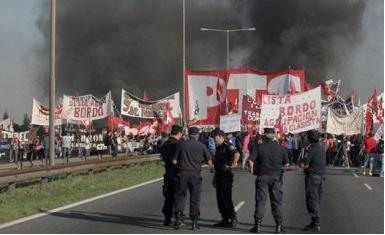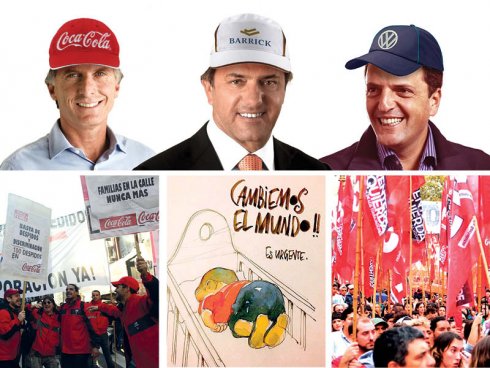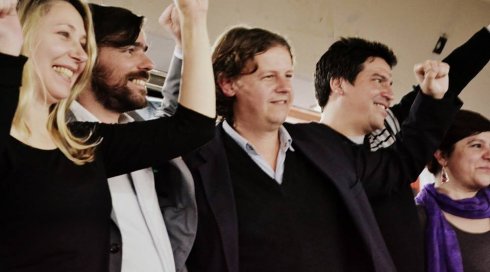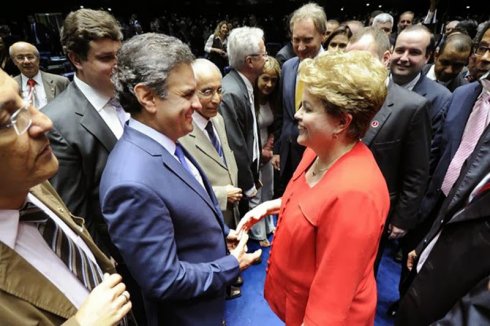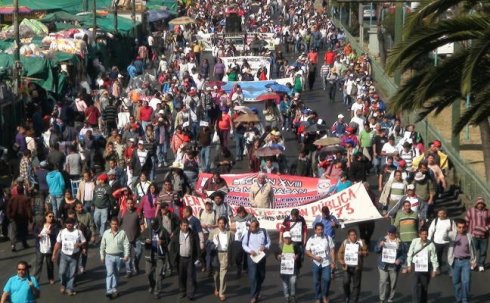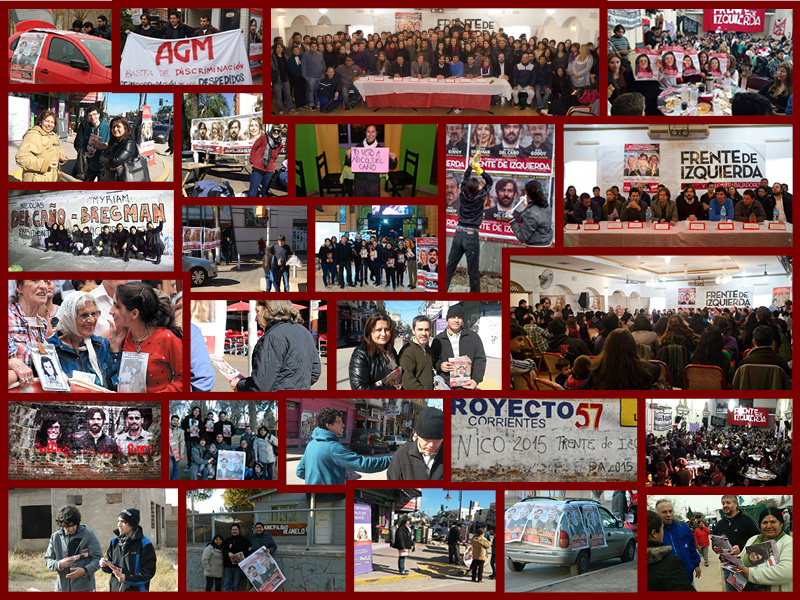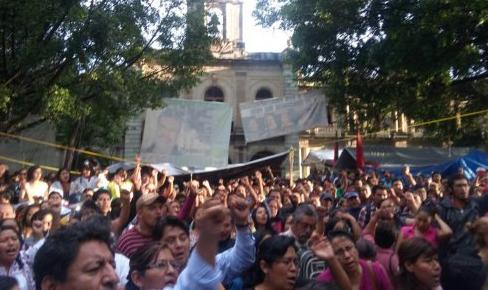Neuquén, Argentina
ZANON expropriated: An unforgettable day!
19/08/2009
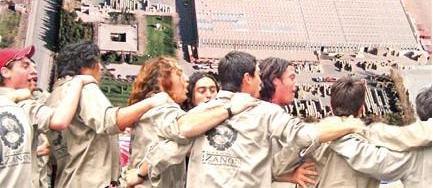
"Eight years have already passed: we do not want any more sweet talk, we want expropriation!" roared the Zanon ceramics workers, accompanied by a big column of state workers, teachers, health workers, social organizations and leftist parties, on the way to the Neuquén legislature, where they would deal with the expropriation of the factory.
The Patagonian wind blew cold and strong, making the wait in front of the provincial Congress unbearable. The ceramics workers, who, eight years ago, dared and seized the plant, started it producing and made their epic a part of the best pages of working-class history of our country, were proudly singing, "Here they are, these are them, the workers of Zanon!" until their throats grew hoarse.
In the days before, Neuquén was a hotbed. Although the Governor had decided in favor of expropriation, complaints were heard from his own party, the MPN, from the right-wing opposition, and from the [union federation] CGT itself, because the factory was being handed over to "lefties," to "criminals." They did not spare any insult, in order to discredit the exemplary struggle of the ceramics workers. The CGT union bureaucracy and the Chamber of Commerce came out to prevent the expropriation from being approved. But they couldn’t.
March to the Legislative building
A big column lead by a banner that said “Carlos Fuentealba is Present,” it was the symbol of the march; a united front of those who supported the ceramic workers struggle for expropriation and those fighting justice for the assassination of the teacher in Arroyito. And remember that Carlos Fuentealba was one of the hundreds of teachers that surrounded Zanon on April 8th, to prevent the workers removal from the factory. Walking up Argentina Avenue the ceramics workers could hear their voices: “We won’t give in, they can go to hell…” they wanted everyone to know that just because they had been promised the expropriation of the factory that the workers and people would not stop fighting or give up supporting every struggle.
The long and tedious legislative session took place with the presences of a delegation of 50 outstanding Zanon veterans accompanied by the Mothers of Plaza de Mayo from Neuquén, delegations of the CTA, workers from INDEC, Buenos Aires Subway, Rio Santiago Shipyard, Brukman, just to name a few. While outside a solidarity act was taking place, where all of the political organizations were speaking. It was a very moving moment when the women, who 9 years ago had organized the first Zanon women’s committee, took to the stage. Alejandro Lopez’s mother showed her son’s shirt from his first struggle and proudly spoke how she came out to support them, her son and his comrades. We paid tribute to those who had passed, to Daniel Ferras, the young worker who died because of the managers’ negligence and which united the ceramics workers together in struggle. We also paid tribute to Boquita, Jorge Esperanza, who recently passed away and members of the SOECN board. It was really moving. And when it reached midnight, after that long cold Wednesday the 12th , and when the bonfires could no longer keep you warm, they voted and declared the expropriation. The celebrations erupted. “Finally”, they yelled, “and to think that some said we could never do it.” They sang, jumped, and embraced each other, some tears rolled down the weather beaten cheeks. The more veteran workers remembered the end of the long, 34 day, strike in 2001; the celebration of that victory after such built up tension. They weren’t wrong about making the comparison; that great strike was the beginning of what, months later, would lead to the most important occupation and worker run ceramics factory to date.
Lolin, one of the dear Comahue mothers, went on stage and with her encouraging words, like many times before, she brought warmth to that frigid night. It was already one in the morning; everyone was still. When they began to chant, “the working class is one, it has no borders,” it was the Brazilian Claudionor Brandao’s turn to speak, leader of SINTUSP (San Palo University Union for non faculty workers), who vindicated the example of Zanon and of expropriation for hundreds of thousands who had lost their jobs in Brazil. Then the leaders of Zanon spoke, the representatives who had the task of keeping the factory running, a company that, in the midst of a capitalist crisis, maintains 470 families. And to reaffirm this unity, the union leaders who will be running for election in two weeks, under the ‘historic’ brown list, (the name of the list in which they are standing), stepped up to the podium.
All of the speakers thanked everyone for their support and endurance, not just for that day, but during the past 10 years of struggle, since the day they had won the Internal Committee. And there was time to hug all of the brothers and sisters who were there from Stefani Ceramics, who are today in the midst of a struggle.
But they’re not going to rest on their laurels. They’re aware that that the achievement of the expropriation isn’t the end, and in the fine print they’re going to want to set a trap (like asking for “peace” or paying the severance pay), it’s that they voted to march to the Legislative building the following day. This is the end of a long saga and the beginning of another, not any less combative or difficult. Because as Raul Goody has said so many times, “Zanon isn’t an island,” and the most concrete example is to illustrate this is the Cutral Co. Stefani Ceramics workers, who have been on strike during the last few months because of a management provocation. Zanon’s struggle and its union continue.
A National and International example
The saga of Zanon is known throughout the country and the word has spread at an international level. With time, this prestige and transcendence won’t diminish it will grow; this has evident in the last year. It’s not just giving merit to the ceramics workers and their leadership; it’s that with the international capitalist crisis, which has resulted in millions of unemployed in the world and thousands of closed factories, the worker occupied factories in Argentina that were provoked during the 2001 crisis, have become an important example and have gained international attention. Eight years later, Zanon’s star shines the brightest. Worker control is different and superior to the cooperative option, which is the course that other worker occupied businesses have taken. Their class conscious union, their organization, their democratic methods where the worker’s assembly decides, the bases control over the management of the business, their military solidarity with hundreds of other conflicts in the country, their position on supporting the needy, forming what they call “community work,” free or inexpensive concerts with bands like Renga, Bersuit, Attaque along with others so the youth in the region can enjoy concerts that are normally to difficult for them to attend. A ceramics factory that’s a militant factory and that won the expropriation. Nobody gave it to them. They didn’t do it by themselves; it was the overwhelming support that the workers received within the region and throughout the country. “Worker’s Unity, and those who don’t like it can go to hell!” They chanted and chanted. They won the expropriation. They struggled and defeated the Nuequen regimen. They left the Legislative building happy, for they had won the battle. The frigid night preserved the eco of the war song of many long days of struggle, which of course was also present in that moment. “Long live the Zanon struggle, long live worker control, because this factory is the peoples, in Zanon they shall not pass.”
RAUL GODOY, SOECN Deputy Secretary: “This factory has made free men”.
I invite all of the comrades to come up, who will soon be part of the new directive committee and who will speaking in representation of the ceramics workers. The comrade Omar Villablanca, comrade “Chaplin, comrade Eugenio from the Cerámica del Sur, comrades from the Cerámica Neuquen, and the comrades who are going to be part of the new steering committee, and Chicho. All of the comrades who are going to be the new managers are here. Long live the activist comrades! I want everyone to know these faces.
We want to tell them that we’re proud. One day the CHILDREN came to the factory and they told us that they saw their fathers in us, the Madres de Plaza de Mayo (mothers of May Plaza) and they told us that they saw in the Zanon workers their own children y and we feel very proud of it. In the midst of the struggle they threatened to kill us, they shot us with rubber bullets. In the midst of it they shot us with lead bullets. And, comrades, we felt that we were going to be reborn, that we were going to be reborn in this factory, like comrade Alejandro said. This factory doesn’t just make ceramics, it has made free men, it has made a project, that from this small example has made a grain of sand that we have contributed to, from this small place in Argentina, from this place in Patagonia, for thousands of comrades around the world, just what we, the workers, are capable of doing. We can stop those who run the world. But we can rebuild it with a different foundation, not on the foundation of exploitation. For the benefit of all of humanity and not for the benefit of just a few. Comrades this is our grain of sand, if the past nine years have been worth anything, you must know that it is this: that it can be used to build our world without exploited or exploiters. Comrades have confidence in your own strength; long live the Zanon workers and the working class struggle! Here and throughout the world!
MARIANO PEDRERO, Lawyer for the SOECN and the Zanon workers: “The obligation to fight for what we deserve”.
Comrades, today we realized a great achievement we made a step forward in what we began some time ago, they told us comrades. And there inside, in the Legislature, there are some who on Friday, or who knows when, wanted to feed us too many lines, because they wanted us to be peaceful. There are some who come and knock on our doors to talk about peace. The bureaucracy of the CGT, who didn’t think twice about handing over the worker’s right, jobs and wages; who didn’t think twice about hiring thugs to try and remove us from the factory in 2002. Phiellip came, one of the ACIPAN holders, bosses’ associations, to talk about peace. But he was part of the University staff during the dictatorship, Dean of the Faculty of the Economics, appointed by Videla during the military dictatorship and two comrades were disappeared from that faculty during the dictatorship.
Those who are managers, and union bureaucrats who brown nose, come to us talking about peace. When there is hunger and unemployment in the province and in the country, because once again we are in the midst of a crisis. A crisis that everyone compares to the 30s, a crisis that is going to obligate the workers and the people to take to the streets. So, we can’t expect peace. Like Lolin just said: We inherited a generation that struggles to change this society, we inherited a generation that stands up. And with Zanon we set the example that the workers can, that we don’t have to give in, that when a boss closes down a factory it doesn’t mean that everyone has a home. Zanon didn’t close because everyone has a floor in their house. When a textile factory closes, it’s not because everyone has clothes. When a factory that produces food closes, it doesn’t mean that everyone has food. So, comrades, we don’t have a right, the workers and the people have an obligation: to occupy the factories to put the factories under workers control; build a program, a perspective. Because we are the ones who keep the world running, we are the ones who keep this world moving day to day and we are the ones who have an alternative so that we aren’t the ones who pay for the crisis. We have to stand up. Zanon is a step. There is no peace! There is an obligation to struggle for what we deserve, which is work and our bread and our families’ bread.
